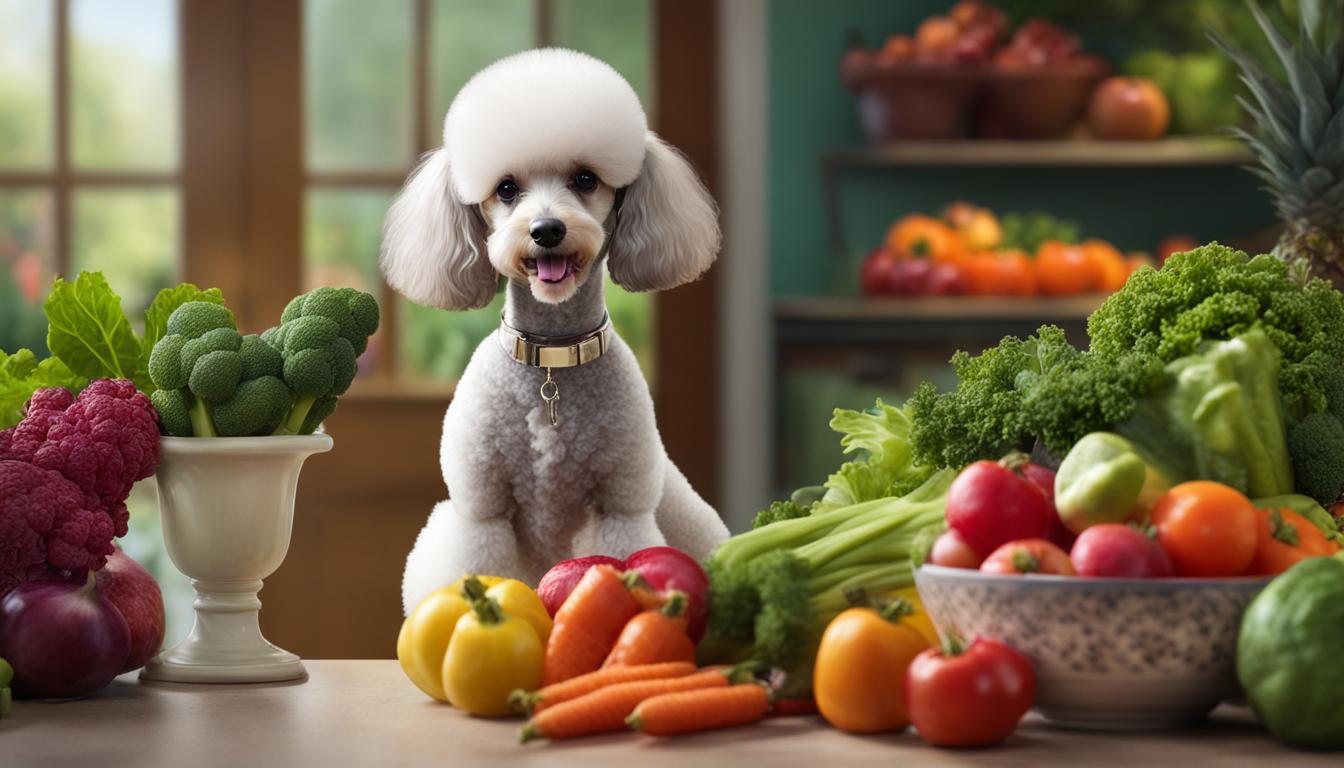Welcome to our comprehensive guide on poodle diet and nutrition. As passionate dog lovers and experts in pet care, we understand the importance of providing the best possible diet for your beloved poodle. A healthy diet is vital for their overall well-being and can contribute to their longevity and happiness. In this guide, we will delve into the specific nutritional needs of poodles at different life stages and provide valuable tips on customization, portion control, food selection, and more. Let’s ensure your poodle thrives on a balanced and nutritious diet!
At the heart of your poodle’s nutrition lies a diet that is tailored to their specific needs. Poodles require a healthy blend of proteins, fats, carbohydrates, vitamins, and minerals to support their muscle health, energy levels, coat quality, and digestive system. With the right knowledge and guidance, you can provide your poodle with a diet that optimizes their health and ensures they enjoy a vibrant and active life.
Whether you’re a new poodle owner or a seasoned enthusiast, this guide will equip you with the essential information you need to make informed decisions about your poodle’s diet. We’ll cover topics such as understanding poodle-specific nutritional needs, customizing their diet for different life stages, managing weight, deciphering dog food labels, incorporating supplements, and more. You’ll gain valuable insights into the key considerations that go into creating a balanced and nourishing diet for your furry friend.
Key Takeaways:
- Poodles have specific nutritional needs that require a balanced and tailored diet.
- Protein is crucial for muscle health, while essential fats contribute to energy and coat health.
- Complex carbohydrates provide energy and support digestive health.
- Vitamins and minerals play a vital role in overall well-being.
- Portion control is essential for maintaining a healthy weight.
Understanding Poodle Specific Nutritional Needs
When it comes to poodle nutrition, understanding their specific dietary needs is crucial for their overall health and well-being. Poodles require a balanced diet that provides them with essential nutrients to support their muscle health, energy levels, coat health, and digestive system. By meeting these nutritional requirements, you can help ensure that your poodle stays healthy and full of vitality.
High-Quality Protein for Muscle Health
Protein is a vital nutrient for poodles as it plays a crucial role in supporting their muscle health. High-quality sources of protein, such as lean meats (chicken, turkey, beef), fish, and eggs, should be incorporated into their diet. These protein sources provide the necessary amino acids that contribute to muscle growth, repair, and maintenance.
Essential Fats for Energy and Coat Health
Essential fats, including omega-3 and omega-6 fatty acids, are essential for poodles’ energy levels and coat health. These fats help provide sustained energy, support organ function, and promote a healthy coat and skin. Incorporating fatty fish, like salmon, into their diet can be an excellent source of these essential fats.
Complex Carbohydrates for Energy and Digestive Health
Complex carbohydrates are a valuable source of energy for poodles. They provide the necessary fuel for their active lifestyles. Incorporating whole grains, vegetables, and legumes into their diet can provide complex carbohydrates while also supporting their digestive health by providing dietary fiber.
Importance of Vitamins and Minerals
Vitamins and minerals play a vital role in supporting various bodily functions in poodles. These essential nutrients are necessary for the proper functioning of their immune system, bone health, and overall well-being. Including fruits, vegetables, and supplements recommended by your veterinarian can help meet their vitamin and mineral requirements.
By understanding and fulfilling poodles’ specific nutritional needs, you can ensure that they receive a balanced and nourishing diet. Providing them with the right amounts of high-quality protein, essential fats, complex carbohydrates, vitamins, and minerals contributes to their overall health, energy levels, and longevity. Additionally, it’s important to take into account factors such as their age, size, activity level, and any specific health concerns when crafting their diet. Meeting the nutritional needs for poodles not only promotes a healthy coat and skin but also supports their immune system and cognitive function. Regularly consulting with a veterinarian can help ensure that their dietary requirements are consistently being met. Tailoring their diet with these considerations in mind can help prevent common health issues and keep them thriving at every stage of life. Incorporating nutritional tips for poodles, such as offering appropriate portion sizes and avoiding harmful foods like chocolate or onions, can make a significant difference in their well-being. Remember, a well-balanced diet not only fuels their physical health but also contributes to their happiness and vitality.
As an Amazon Associate, We earn from poodle-related purchases you make.
No extra cost to you, but kibbles for us.
Customizing Diet for Poodle Life Stages
As responsible poodle owners, it’s essential to understand that poodles have unique dietary needs at different stages of their lives. Customizing their diet according to their specific life stage is key to ensuring their overall health and well-being. In this section, we will explore the nutritional requirements for poodles during their puppy, adult, and senior years, providing you with valuable insights and recommendations for optimizing their diet.
Puppy Nutritional Requirements for Growth
During the puppy stage, poodles require a well-balanced diet that supports their rapid growth and development. It is crucial to provide them with adequate protein, healthy fats, and essential vitamins and minerals to help build strong muscles, bones, and organs. High-quality puppy food specifically formulated for small to medium-sized breeds, such as poodles, is recommended. Ensure that the food contains a suitable ratio of protein and fat to meet their energy needs and promote healthy growth.
Adult Poodle Diet for Maintenance
As poodles transition into adulthood, their nutritional needs shift from growth to maintenance. A balanced diet that maintains their weight, supports their immune system, and promotes overall health is essential. Opt for high-quality adult dog food that provides the right balance of protein, carbohydrates, and healthy fats. Consider the specific needs of your poodle based on factors such as their activity level, size, and any health concerns. Consulting with a veterinarian can help you determine the best food options for your adult poodle’s maintenance diet.
Senior Poodle Needs for Health Management
As poodles enter their senior years, their nutritional requirements may change once again. Senior dogs often have lower energy requirements and may experience age-related health issues, such as joint problems or a decreased immune system function. Adjusting their diet to meet these changing needs is crucial for their well-being. Senior dog food formulas that are specially formulated for older dogs can be beneficial. These formulas typically contain lower calories, higher levels of joint-supporting nutrients, and antioxidants to support their overall health and vitality.
Remember, poodle weight management, poodle food recommendations, and poodle health and nutrition should always be top priorities when customizing your poodle’s diet at each life stage. Now, let’s explore some recommendations for managing their weight and promoting optimal health through diet.

Optimal Portion Sizes for Poodle Weight Management
Proper portion control plays a crucial role in managing the weight of your poodle. By ensuring they receive the right amount of food, you can help them maintain a healthy weight and prevent obesity-related health issues. Determining the optimal portion sizes for your poodle involves considering several factors such as age, size, activity level, and weight management goals.
To establish an appropriate feeding guideline, start by consulting with your veterinarian. They can provide specific recommendations tailored to your poodle’s individual needs. In general, the following guidelines can serve as a starting point:
- Age: Puppies require more frequent meals and slightly larger portions to support their growth. As they transition into adulthood, the portion sizes can be adjusted accordingly.
- Size: Smaller poodles will typically require less food than larger ones. Adjust the portion sizes accordingly to ensure they receive enough nutrition without overfeeding.
- Activity Level: Poodles with high activity levels may need larger portions to fuel their energy needs. On the other hand, less active poodles may require smaller portions to avoid excess calorie intake.
- Weight Management Goals: If your poodle needs to lose or maintain weight, portion sizes should be adjusted accordingly. Your veterinarian can provide specific guidelines for weight management.
It’s important to monitor your poodle’s body condition regularly. Pay attention to their weight, body shape, and overall health. Adjust the portion sizes as needed to ensure they remain in optimal condition. Regular exercise also plays a key role in maintaining your poodle’s physical and mental well-being, so ensure they stay active with appropriate daily activities. Additionally, proper grooming is essential; following consistent grooming tips for poodles can help keep their coat healthy and tangle-free while also allowing you to inspect for any skin issues or abnormalities. Combine a balanced diet, exercise, and grooming to ensure your poodle thrives. Additionally, regular vet check-ups can help detect and address any emerging concerns early on. This is especially important because common poodle health issues, such as hip dysplasia, progressive retinal atrophy, and Addison’s disease, can often benefit from timely intervention. Staying proactive with their diet, exercise, and healthcare routine will contribute to your poodle’s long-term well-being.
Remember, every poodle is unique, and their nutritional needs may vary. Regular communication with your veterinarian is essential for developing a balanced and tailored diet plan for your furry friend.
By maintaining optimal portion sizes, you can promote a healthy weight for your poodle and contribute to their overall well-being. Providing them with a balanced diet sets a foundation for a long and happy life together.

Poodle Diet and Nutrition: High-Quality Food Selection
Choosing the right food for your poodle is essential for their overall health and well-being. Feeding them a high-quality diet is one of the best ways to ensure they receive the necessary nutrients to thrive. When selecting food options for your poodle, it’s important to consider factors such as ingredient quality, nutritional content, and breed-specific needs.
High-quality food for poodles should contain:
- High-quality protein sources, such as chicken, turkey, or fish, to support muscle health and provide essential amino acids.
- Healthy fats, like omega-3 and omega-6 fatty acids from sources like salmon oil or flaxseed, to promote coat health and provide energy.
- Complex carbohydrates, including whole grains like brown rice or quinoa, for sustained energy and optimal digestion.
- A balanced blend of vitamins and minerals to support overall health and immune function.
By prioritizing these nutrient-rich ingredients, you can ensure that your poodle receives the best possible nutrition.
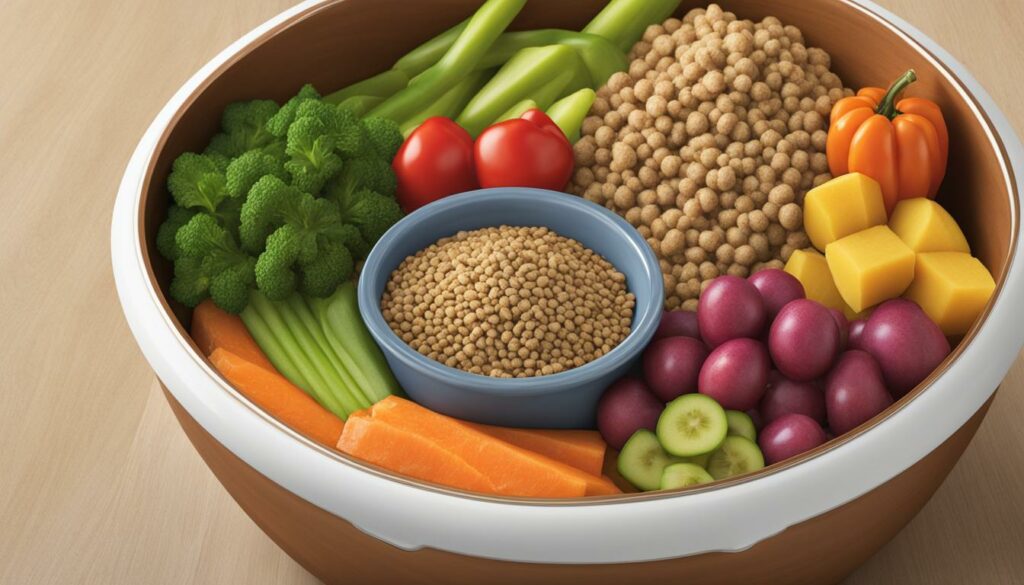
“Feeding your poodle high-quality food is an investment in their long-term health. By providing them with a nutritious diet, you can help prevent health issues and keep them happy and thriving.”– Poodle Nutrition Expert
It’s important to note that the best food for poodles may vary depending on factors such as age, size, activity level, and any specific health concerns. Consulting with your veterinarian can provide additional guidance to choose the most suitable food for your poodle’s individual needs.
When selecting the best food for your poodle, consider both your budget and the specific needs of your pet. It’s also a good idea to gradually transition to a new food to avoid digestive upset.
Remember, proper nutrition is key to supporting your poodle’s health and longevity. By choosing high-quality food that meets their nutritional needs, you can ensure that they thrive and live their best lives.
Deciphering Dog Food Labels: What to Look for?
Understanding how to read and decipher dog food labels is crucial for poodle owners who want to make informed choices about their pet’s nutrition. By decoding the information on the label, you can ensure that your poodle is receiving a high-quality diet that meets their specific dietary needs.
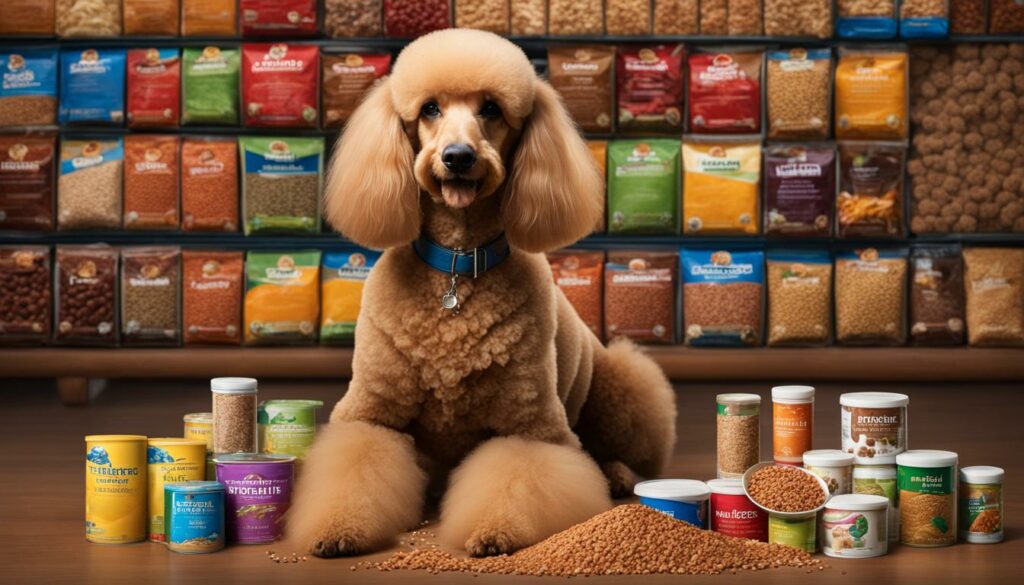
Identifying Quality Protein Sources
Protein is an essential nutrient for poodles as it supports muscle development and overall health. When examining the dog food label, look for quality protein sources listed as the main ingredients. Examples of high-quality protein sources for poodles include deboned chicken, turkey, salmon, and lamb. Avoid foods that list meat by-products, fillers, or unnamed sources of protein.
Understanding Guaranteed Analysis
The guaranteed analysis section on dog food labels provides important information about the nutrient content of the food. Pay attention to the percentages of crude protein, crude fat, crude fiber, and moisture. These values give you insights into the nutritional composition of the food and help you determine if it meets your poodle’s dietary requirements.
Evaluating Preservatives and Additives
Poodles thrive on a clean and natural diet, free from harmful preservatives and additives. Take a close look at the ingredient list to identify any artificial preservatives, colors, or flavors that may be present. Opt for foods that use natural preservatives such as mixed tocopherols (vitamin E) instead of chemicals like BHA, BHT, and ethoxyquin.
Additionally, be cautious of excessive carbohydrate fillers, such as corn, wheat, and soy, as they can lead to allergies or weight gain in some poodles. Instead, look for foods that prioritize wholesome ingredients like whole grains, vegetables, and fruits.
By deciphering dog food labels and making informed choices, you can provide your poodle with the nutrition they need for optimal health and well-being.
Meal Planning and Frequency for Balanced Poodle Diet
Creating a balanced meal plan is crucial for ensuring that your poodle gets all the nutrients it needs to thrive. Meal planning involves carefully selecting the right ingredients and determining the appropriate feeding schedule for your furry friend. Let’s explore how you can plan your poodle’s meals to meet its nutritional needs and maintain a balanced diet.
When planning meals for your poodle, it’s essential to consider its specific nutritional needs. Poodles require a diet that is rich in high-quality protein, essential fats, complex carbohydrates, vitamins, and minerals. These nutrients are vital for your poodle’s muscle health, energy levels, digestive health, and overall well-being.
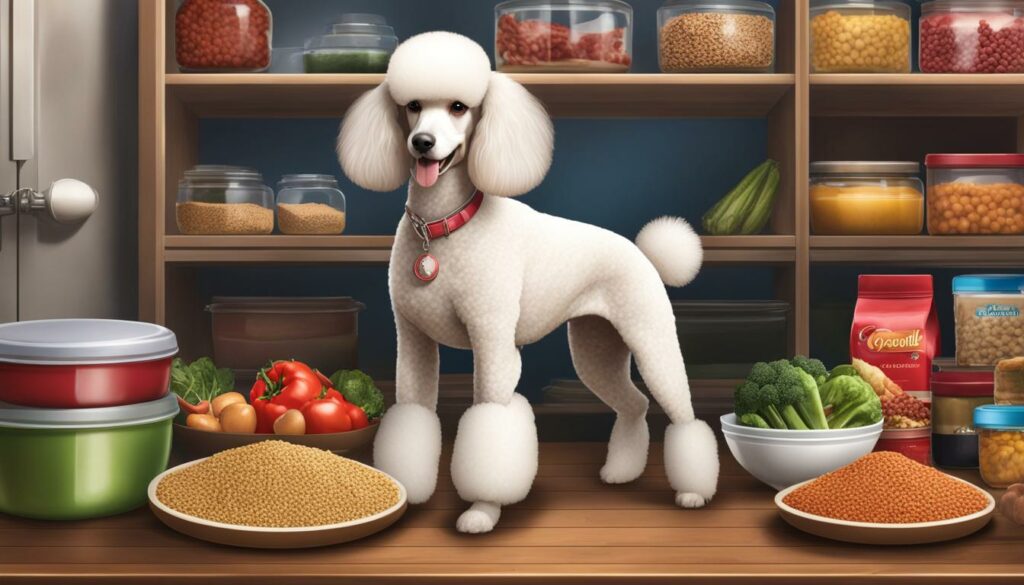
The following table provides an example of a balanced meal plan for a poodle:
| Meal | Composition |
|---|---|
| Breakfast | High-quality protein source (such as chicken or fish), steamed vegetables, and a small amount of whole grains |
| Lunch | Lean protein source (such as turkey or tofu), cooked sweet potatoes, and a small portion of leafy greens |
| Dinner | Protein source (such as beef or lamb), mixed vegetables, and a serving of brown rice |
| Snack | Low-fat cottage cheese or plain yogurt |
It’s important to note that the portion sizes may vary depending on your poodle’s age, weight, activity level, and overall health. Consult with your veterinarian to determine the appropriate portion sizes for your poodle.
In addition to meal planning, establishing the right feeding frequency is crucial for a balanced poodle diet. Most adult poodles do well with two meals a day, while puppies may require more frequent feeding. However, some poodles may benefit from smaller, more frequent meals to manage conditions such as hypoglycemia or digestive issues. It’s best to consult with your veterinarian to determine the ideal feeding frequency for your poodle. In determining how many times to feed a poodle, factors such as age, size, activity level, and overall health all play a role. Active or pregnant poodles may require an adjusted feeding schedule to meet their increased energy demands. Monitoring your poodle’s weight and behavior after meals can also help fine-tune their feeding routine for optimal health.
Remember, a balanced meal plan and feeding schedule are essential for meeting your poodle’s nutritional needs. By providing a well-rounded and nourishing diet, you’ll support your poodle’s overall health and well-being, ensuring a happy and energetic companion.
Incorporating Supplements in Poodle Diet
Supplements can play a valuable role in supporting your poodle’s overall health and well-being. When it comes to poodle nutrition, incorporating appropriate supplements can help ensure that your furry friend is getting all the essential nutrients they need. In this section, we will explore when to consider multivitamins, beneficial joint supplements for poodles, and the role of probiotics for digestive health.
When to Consider Multivitamins
Multivitamins can be beneficial for poodles, especially if they have specific dietary requirements or if their regular diet is lacking in certain nutrients. It’s important to consult with your veterinarian to determine if your poodle can benefit from a multivitamin supplement. They can help identify any nutrient deficiencies or specific health concerns that may require additional supplementation.
Beneficial Joint Supplements for Poodles
Poodles, like other dog breeds, can be prone to joint issues such as arthritis and hip dysplasia. Joint supplements containing ingredients like glucosamine, chondroitin, and MSM can help support joint health, reduce inflammation, and promote mobility. However, it’s crucial to consult with your veterinarian before introducing any joint supplements into your poodle’s diet, as they can recommend the most appropriate options based on your dog’s specific needs.
The Role of Probiotics for Digestive Health
Probiotics are beneficial bacteria that can promote a healthy digestive system in poodles. They can help maintain a balanced gut microbiome, improve digestion, and enhance nutrient absorption. Probiotics can be especially useful when transitioning to a new diet, dealing with digestive issues, or after a course of antibiotics. Talk to your veterinarian about incorporating probiotics into your poodle’s diet and selecting a high-quality supplement specifically formulated for dogs.
Remember, supplements should never replace a balanced diet for your poodle. They should be used as a complementary addition to support their overall nutritional needs. Always consult with your veterinarian before introducing any new supplements into your poodle’s diet, as they can provide personalized guidance based on your dog’s specific requirements.
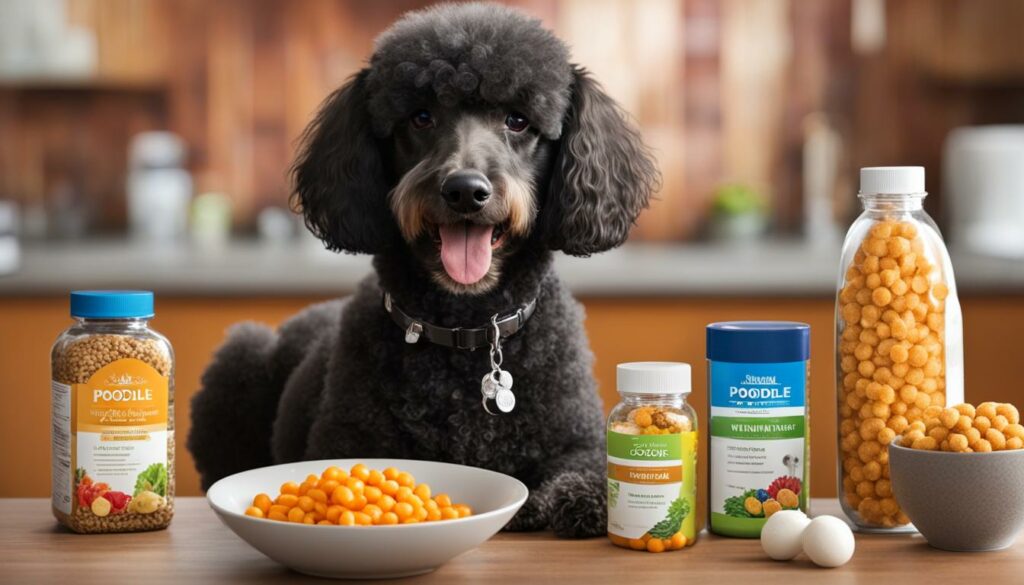
Transitional Feeding: Puppies to Adults
Transitioning a poodle’s diet from puppy to adult food is an important step in their nutritional journey. It involves gradually introducing new food while phasing out the puppy food to ensure a smooth transition and minimize digestive issues. Here are the steps to safely transition your poodle’s diet:
Steps to Transition Diet Safely
- Start by mixing a small amount of adult food with the puppy food. Begin with a ratio of 25% adult food and 75% puppy food.
- Over the course of 7-10 days, gradually increase the proportion of adult food while decreasing the amount of puppy food. For example, on day 3, switch to a 50/50 ratio, and by day 7-10, your poodle should be primarily eating adult food.
- Observe your poodle’s response to the transition. Look for any signs of digestive upset, such as diarrhea or vomiting. If you notice any issues, slow down the transition process and give your poodle more time to adjust.
Assessing Your Poodle’s Dietary Reaction
During the transition period, it’s essential to monitor your poodle’s dietary reaction. Keep an eye out for any changes in their stool consistency, appetite, energy levels, or overall well-being. If you notice any worrisome symptoms, consult your veterinarian for guidance.
Choosing Adult Food Formulas
When selecting adult food formulas for your poodle, consider their specific needs and preferences. Look for high-quality options that provide balanced nutrition and meet the recommended dietary requirements for adult poodles. Consult with your veterinarian or a professional dog nutritionist to ensure you’re making the right choice for your furry friend.
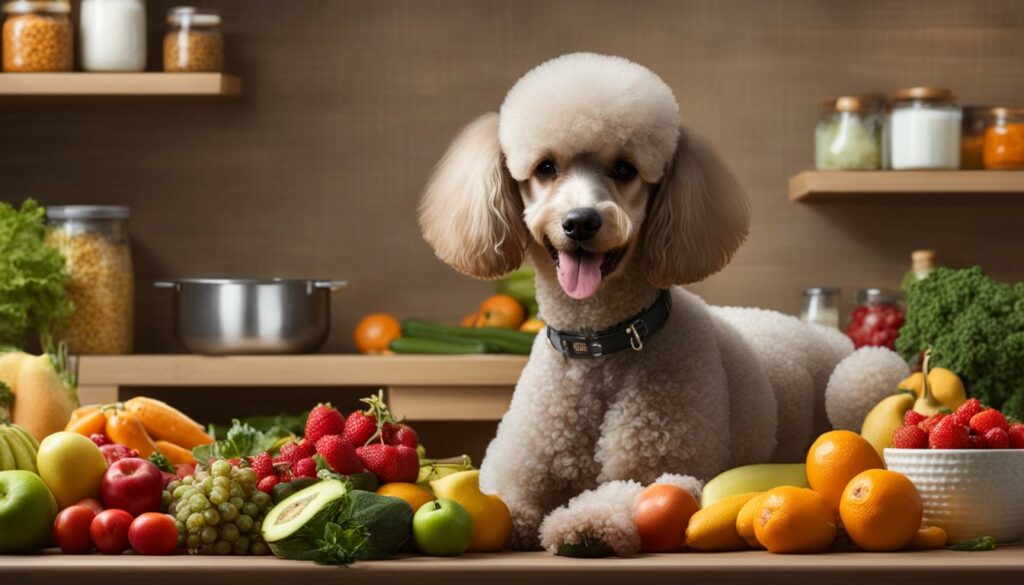
Wet vs. Dry Dog Food: Pros and Cons for Poodles
When it comes to choosing the best food for your beloved poodle, one of the decisions you’ll need to make is whether to feed them wet or dry dog food. Both options have their own set of pros and cons, and it’s important to consider your poodle’s specific needs and preferences before making a decision.
Wet Dog Food:
Wet dog food, also known as canned dog food, is a popular choice among poodle owners for several reasons. One of the main advantages of wet dog food is its high moisture content, which can help keep your poodle hydrated, especially if they don’t drink enough water throughout the day. Additionally, wet dog food tends to have a stronger aroma and flavor, making it more enticing for picky eaters. It’s often recommended for poodles with dental issues or older dogs who may have difficulty chewing dry kibble.
However, there are a few considerations to keep in mind when feeding your poodle wet dog food. Wet dog food typically has a shorter shelf life once opened, so you’ll need to make sure to refrigerate any leftovers and use them within a few days. It can also be more expensive compared to dry dog food, especially if you’re feeding a larger poodle or multiple dogs.
Dry Dog Food:
Dry dog food, also known as kibble, is the more common choice for poodle owners due to its convenience and affordability. Dry dog food is easy to store, has a longer shelf life, and doesn’t require refrigeration. It’s also beneficial for maintaining your poodle’s dental health, as the chewing action helps remove plaque and tartar buildup. Dry dog food is available in a wide variety of formulas, making it easier to find a specific blend that meets your poodle’s dietary needs.
However, it’s important to note that dry dog food has a lower moisture content compared to wet dog food. This means that your poodle may need to drink more water to stay properly hydrated. Some poodles may also be more prone to food allergies or sensitivities, and dry dog food may contain more potential allergens, such as grains, depending on the formula you choose.
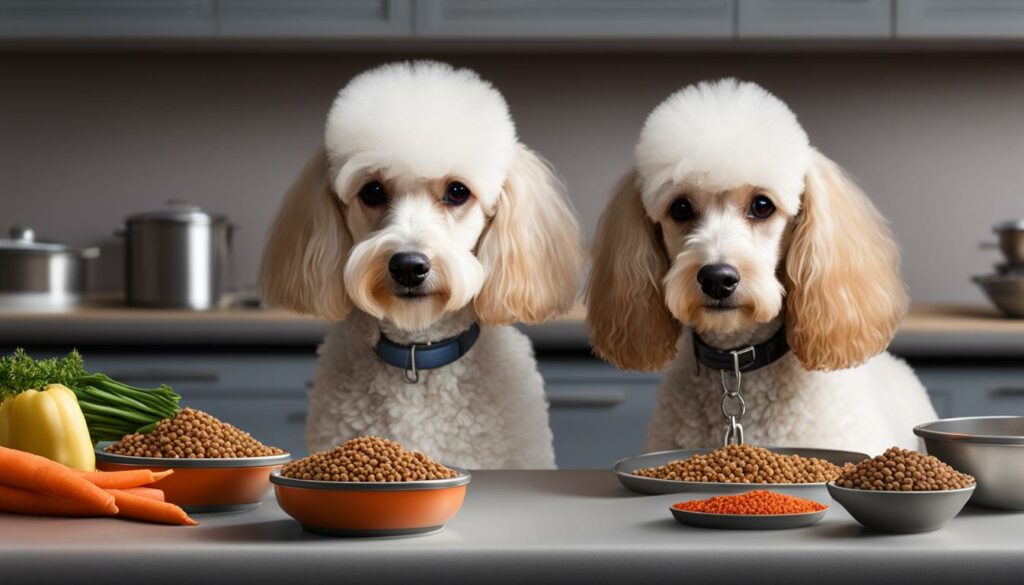
| Wet Dog Food | Dry Dog Food |
|---|---|
| High moisture content | Convenient and easy to store |
| Strong aroma and flavor | Beneficial for dental health |
| May be more expensive | May contain potential allergens |
Ultimately, the decision between wet and dry dog food for your poodle will depend on their individual needs and your personal preferences. Some poodle owners even choose to combine wet and dry dog food by mixing them together as a balanced meal. Whichever option you choose, make sure to select a high-quality dog food specifically formulated for poodles to ensure they receive the necessary nutrients for optimal health and well-being.
As an Amazon Associate, We earn from poodle-related purchases you make.
No extra cost to you, but kibbles for us.
Identifying and Managing Poodle Food Sensitivities
As responsible poodle owners, it’s crucial to be aware of the potential food sensitivities that your furry friend may have. Poodles, like all dogs, can develop adverse reactions to certain foods, leading to discomfort and health issues. In this section, we will explore common food allergens for poodles, the implementation of an elimination diet to identify sensitivities, and alternative foods and ingredients that can be included in their diet.
Common Food Allergens for Poodles
In order to effectively manage poodle food sensitivities, it is important to identify the common food allergens that may trigger adverse reactions. These allergens can vary from one poodle to another, but some common culprits include:
- Grains such as wheat, corn, and soy
- Proteins like beef, chicken, and dairy
- Eggs
- Fish
Keep in mind that these are just a few examples, and each poodle may have unique sensitivities. Consult with your veterinarian to determine the specific allergens that may be problematic for your poodle.
Implementing an Elimination Diet
An elimination diet is a valuable tool in identifying food sensitivities in poodles. This process involves removing potential allergens from the diet and reintroducing them one by one to observe any adverse reactions. Here are the steps to implement an elimination diet effectively:
- Consult with your veterinarian to discuss the elimination diet plan and determine the appropriate duration.
- Choose a limited ingredient dog food that excludes common allergens.
- Feed your poodle the elimination diet for a specified period, typically 6-8 weeks.
- Monitor your poodle closely during this time for any changes in behavior, digestive issues, or skin problems.
- After the elimination phase, reintroduce potential allergens one at a time, in small quantities.
- Observe your poodle’s reactions to each reintroduced food, noting any signs of sensitivity.
- Based on your observations, work with your veterinarian to customize a diet that avoids trigger foods.
Alternative Foods and Ingredients
Once you have identified the food sensitivities of your poodle, it’s important to find suitable alternatives that meet their dietary needs. There are various options available, such as: grain-free or limited-ingredient dog foods that are specifically formulated for sensitive stomachs. Additionally, you can explore homemade diet recipes for poodles, which allow you to customize meals using fresh, wholesome ingredients that cater to their specific sensitivities. Always consult with your veterinarian to ensure the chosen alternatives provide balanced nutrition and meet your poodle’s health requirements.
- Novel protein sources like turkey, duck, or venison
- Grain-free dog foods
- Limited ingredient diets
- Hypoallergenic dog foods
When choosing alternative foods and ingredients, always check the labels to ensure they are specifically formulated to meet poodle dietary needs and free from allergens that trigger sensitivities.
In conclusion, identifying and managing food sensitivities in poodles requires careful observation, the implementation of an elimination diet, and a focus on alternative foods and ingredients that meet their specific dietary needs. By taking these steps, you can help ensure that your poodle enjoys a healthy and balanced diet that supports their overall well-being.
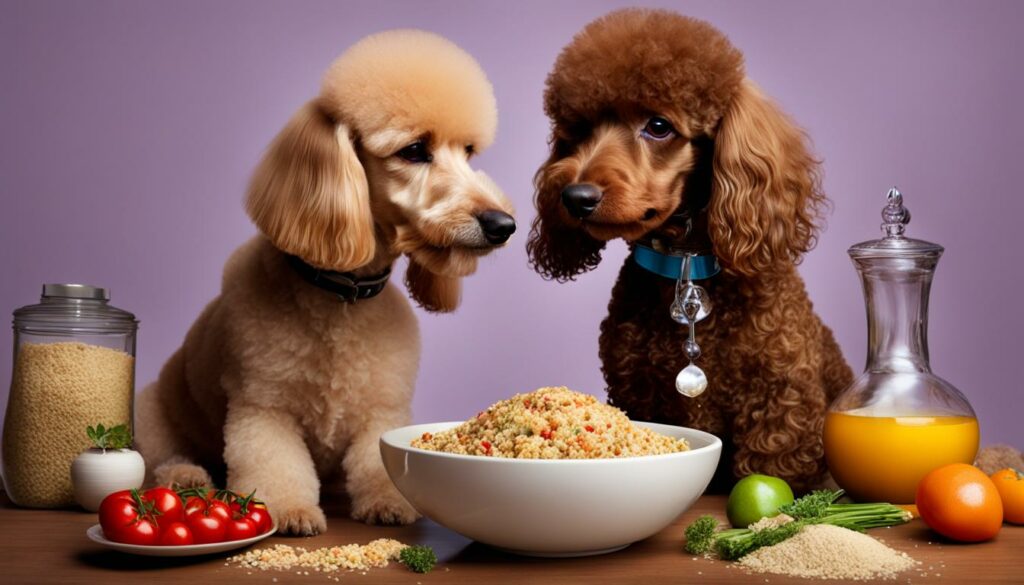
Conclusion
Throughout this essential guide to poodle diet and nutrition, we have emphasized the importance of providing a balanced and tailored diet for your beloved poodles. By understanding their specific nutritional needs and customizing their diet for different life stages, you can ensure their overall health and well-being.
We have highlighted the significance of high-quality protein for muscle health, essential fats for energy and coat health, complex carbohydrates for energy and digestive health, and the role of vitamins and minerals in supporting their overall well-being.
Remember, portion control is key to maintaining a healthy weight for your poodle. By determining the optimal portion sizes based on their age, size, activity level, and weight management goals, you can help prevent obesity and related health issues. Additionally, it’s important to establish consistent feeding times and avoid overindulging with treats, as these habits can contribute to excess weight gain. Incorporating regular exercise into your poodle’s routine, such as daily walks or playtime, is another essential part of poodle obesity prevention tips. By combining proper portion control with an active lifestyle, you can support your poodle’s overall health and well-being.
When it comes to selecting the best food for your poodles, be sure to choose high-quality options that meet their specific needs. Pay attention to the ingredients, nutritional content, and consider the recommendations of breed-specific diets.
Lastly, consult with your veterinarian before incorporating supplements into your poodle’s diet. They can provide guidance on when to consider multivitamins, beneficial joint supplements, and the role of probiotics for digestive health.
In conclusion, by following the guidance provided in this essential guide to poodle diet and nutrition, you can ensure that your poodles live a long, healthy, and happy life. Consistently meeting your poodle’s nutritional needs not only enhances their overall quality of life but also helps prevent common health issues associated with poor diet. Additionally, understanding poodle health insurance basics can provide peace of mind, ensuring you’re prepared for unexpected veterinary expenses. Together, a balanced diet and proper health coverage will support your furry friend’s well-being for years to come.
FAQ
What is the importance of a balanced diet for poodles?
A balanced diet is crucial for poodles to ensure their overall health and well-being. It provides them with the necessary nutrients, including high-quality protein, essential fats, complex carbohydrates, vitamins, and minerals, to support muscle health, energy levels, digestive health, coat health, and overall body functions. A proper feeding routine tailored to their size, age, and activity level is also important to prevent overfeeding or nutrient deficiencies. Some balanced diet tips for poodles include choosing a high-quality dog food that lists real meat as the primary ingredient and incorporating fresh fruits and vegetables in moderation as healthy treats. Additionally, always ensure they have access to clean water to stay hydrated and support optimal health. Maintaining a balanced diet for poodles also helps in managing their weight, which is essential to avoid obesity-related health issues such as joint problems and diabetes. Regularly consulting with a veterinarian can ensure their dietary needs are being met while adjusting their food intake as they age or experience changes in activity levels. By prioritizing a balanced diet for poodles, owners can help their furry companions lead a longer, healthier, and more energetic life.
What kind of protein is best for poodles?
Poodles thrive on high-quality protein sources such as lean meats (chicken, turkey, beef), fish, and eggs. These protein sources are essential for maintaining muscle health and providing the necessary amino acids for growth and repair.
Why are essential fats important for poodles?
Essential fats, such as omega-3 and omega-6 fatty acids, play a vital role in poodles’ energy production, coat health, and overall well-being. Including sources like fish oil, flaxseed oil, and poultry fat in their diet can support healthy skin, a shiny coat, and reduced inflammation.
How do complex carbohydrates benefit poodles?
Complex carbohydrates, found in whole grains, fruits, and vegetables, provide poodles with sustained energy, fiber for digestive health, and essential vitamins and minerals. Including these carbohydrates in their diet supports optimal digestion and overall nutrient absorption.
What role do vitamins and minerals play in a poodle’s diet?
Vitamins and minerals are essential for poodles’ overall health, immune function, and cell regeneration. They support various bodily functions and help prevent deficiencies and health issues. Including a variety of fresh fruits, vegetables, and high-quality dog food can provide the necessary vitamins and minerals.
How should I customize a poodle’s diet for different life stages?
Puppies have different nutritional requirements than adult and senior poodles. During the growth stage, puppies require higher levels of protein, fat, and calories to support their development. Adult poodles need a well-balanced diet for maintenance, while senior dogs may benefit from joint supplements and reduced calories for weight management. Consult your veterinarian for specific recommendations.
How can I determine the optimal portion size for my poodle?
Optimal portion sizes for poodles depend on factors such as age, size, activity level, and weight management goals. It’s crucial to monitor your poodle’s weight and body condition and consult your veterinarian for personalized portion size recommendations. Feeding guidelines on dog food packaging can provide a starting point.
What should I consider when selecting high-quality food for my poodle?
When choosing food for your poodle, look for high-quality ingredients, real meat as the primary protein source, limited fillers and by-products, and a well-balanced nutritional profile. Consider your poodle’s specific needs, such as weight management or food sensitivities, and consult your veterinarian for recommendations.
How can I decipher dog food labels to make informed choices for my poodle?
Understanding dog food labels is essential. Look for quality protein sources listed as the first ingredient, analyze the guaranteed analysis for nutritional content, and avoid foods with excessive preservatives and additives. Educate yourself on industry-specific terms and consult your veterinarian if you have any concerns or questions.
How should I plan my poodle’s meals for a balanced diet?
Creating a balanced meal plan for your poodle involves including a mix of high-quality protein, healthy fats, complex carbohydrates, and essential vitamins and minerals. Consider your poodle’s specific nutritional needs and divide their daily food intake into appropriate portion sizes. Establish a regular feeding schedule to maintain consistency.
Should I include supplements in my poodle’s diet?
While a balanced diet should provide most of the necessary nutrients, some poodles may benefit from supplements. Consult your veterinarian before incorporating supplements. Multivitamins, joint supplements for older poodles, and probiotics for digestive health are common supplements to consider based on your poodle’s individual needs.
How do I transition my poodle’s diet from puppy to adult food?
When transitioning your poodle from puppy to adult food, do it gradually over several days or weeks to avoid digestive upset. Start by mixing a small amount of adult food with the puppy food and gradually increase the proportion of adult food. Monitor your poodle’s stools and overall well-being during the transition.
Should I feed my poodle wet or dry dog food?
Both wet and dry dog food can be suitable choices for poodles. Wet food provides hydration and higher moisture content, while dry food promotes dental health and convenience. Consider your poodle’s specific needs and consult your veterinarian to determine the best option for your poodle’s diet.
How can I identify and manage food sensitivities in my poodle?
Common food allergens for poodles include chicken, beef, dairy, and grains. If you suspect food sensitivities, consider implementing an elimination diet to identify triggers. Gradually reintroduce foods to identify specific sensitivities. Alternative proteins like fish or novel protein sources may be suitable for poodles with dietary restrictions.
